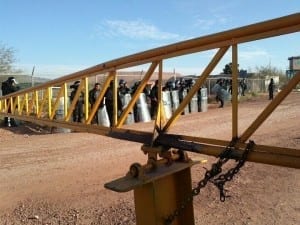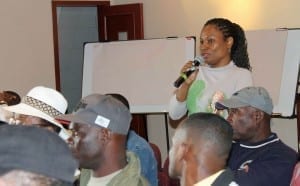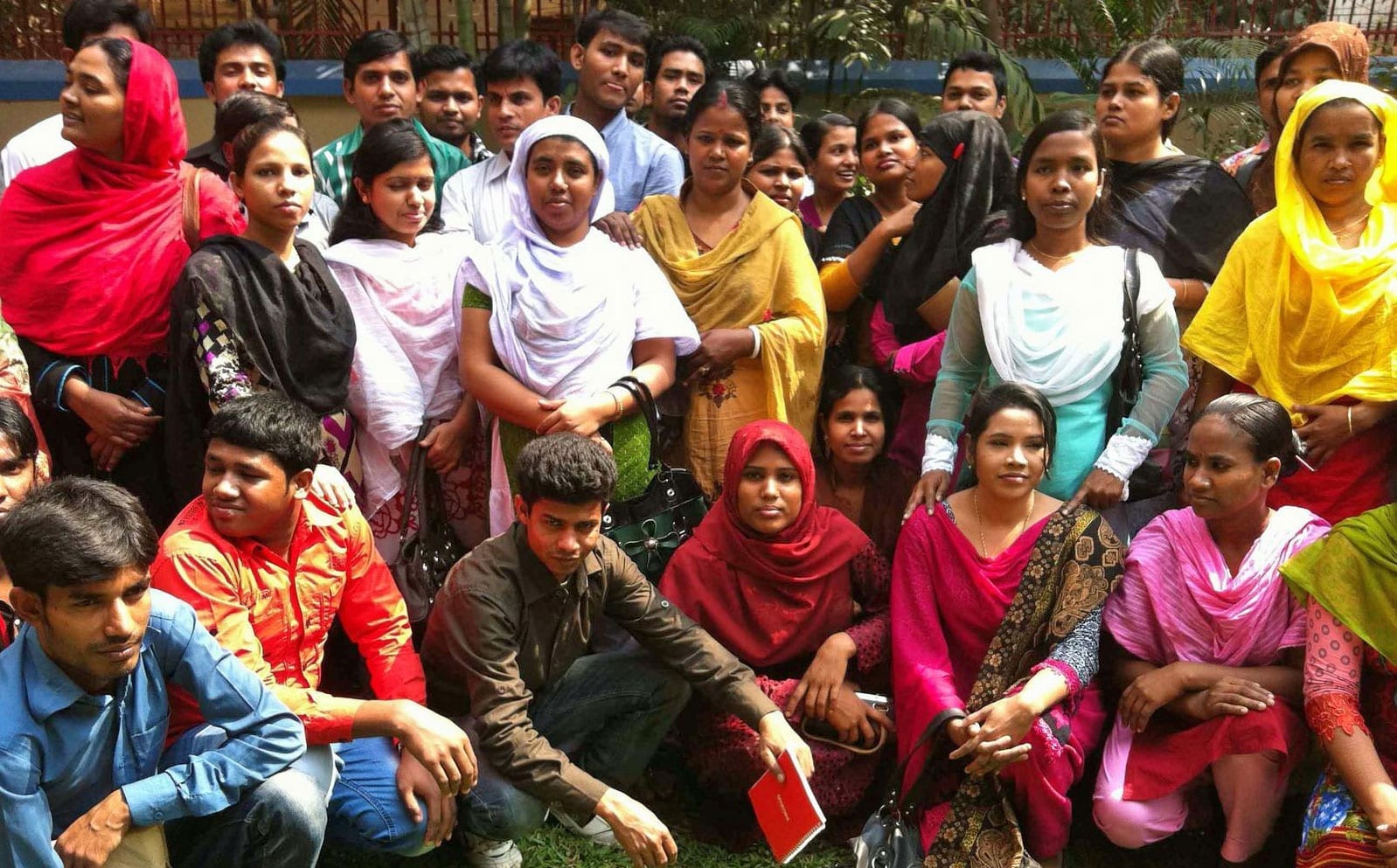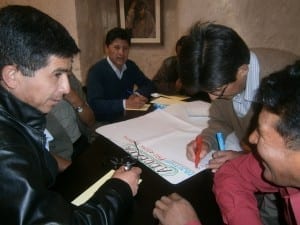Feb 28, 2014

Miners at the El Coronel mine in Zacatecas, Mexico, voted to join the union Los Mineros. Photo: Julia Quiñonez
Mineworkers at the El Coronel gold mine in Zacatecas, Mexico, have voted to join the National Union of Mine, Metal, Steel and Similar Workers of the Mexican Republic, known as “Los Mineros” or SNTMMSSRM in Spanish, with 425 workers voting for the union to be its bargaining representative.
A team of international observers from non-governmental organizations and unions monitored the election and reported that the “voting on February 21 was conducted in a substantively fair and transparent manner, free of interference from the employer or government officials.”
Three unions were represented on the ballot, including Los Mineros. As it has done on previous occasions when there is concern of violence or vote-rigging, the Solidarity Center convened an international team of observers to ensure that the voting process was fair. The team served as a visible presence seeking to reduce the risk of any clashes, intimidation, or harassment and to detect any irregularities in the process that could have hindered the successful completion of a free election. Members of the independent observation team are all trained and experienced in international protocols for election observation, such as only interviewing workers after they have voted and not asking workers which union they voted for or other personal information.
The team included representatives of the Solidarity Center, United Steelworkers (USW), Border Committee of Women Workers (Comité Fronterizo de Obrer@s (CFO), the Project on Organizing, Development, Education and Research (PODER) and Project for Economic, Social and Cultural Rights (ProDESC).
More details about the campaign are available from the USW.
Feb 28, 2014

Some 127 labor activists took part in the second Afro-Colombian Labor Council conference in Bogotá. Credit: Rhett Doumitt
Ready to power forward with new grassroots organizing and mobilization outreach, 127 Afro-Colombian labor and community leaders met in Bogotá in recent days for the second national forum of the Afro-Colombian Labor Council (CLAF).
During the two-day gathering, Afro-Colombian labor rights activists shared the organization’s successes—among them, the amazing growth of the Domestic Service Workers’ Union (UTRASD) from a locally based group in the city of Medellín to a nationwide organization with 250 women.
A quarter of Colombia’s population is Afro-descendant, yet Afro-Colombians comprise more than 50 percent of the country’s poor. Formed in July 2012, CLAF is the first national organization to explicitly tackle the exploitive working conditions that most Afro-descendants suffer. Since its launch, CLAF has expanded from a national coordination board to an organization with 10 local chapters across Colombia, including Bogotá, Cartagena, Santa Marta, Urabá, Valle del Cauca, Medellín and Buenaventura.
“When you build things collectively, then everyone takes ownership of them,” said Agripina Hurtado, president of the CLAF executive board. “We need to promote the vision of where we are going—grow, connect and advocate around the challenges facing all Afro-Colombians.”
The non-governmental organization Escuela Nacional Sindical (ENS) presented research on working conditions in predominantly Afro-Colombian economic sectors, such as construction, domestic work, and ports, where ENS researchers found extreme levels of labor informality. Afro-Colombians are far likelier than other Colombian workers to earn less than the minimum wage and to be employed in jobs where they cannot form unions to improve their working conditions.
Leaders and activists at the meeting, held with the support of the Solidarity Center and the International Labor Organization (ILO), developed a three-pronged work strategy focusing on organization building, public policy advocacy and formalization of work.

Feb 25, 2014
A Bangladesh garment worker leader and four union organizers, among them two women, were badly injured Saturday when about two dozen people beat, kicked and threw them to the ground as the five were speaking to workers in the dormitory where they live. One of the organizers was taken from the scene, beaten severely and dumped, unconscious, nearby. He and a female organizer remain in the hospital. The whereabouts of the garment worker are unknown.
According to several witnesses, the attack was carried out by factory managers and other men and women, some of them who worked for the factory, potentially paid to carry out the act—not an uncommon practice in the country. The women in the group were separated from the others and threatened with rape.
The organizers, all working with the Bangladesh Federation of Workers Solidarity, were supporting workers who had earlier approached the union for assistance and who had been fighting to be paid the minimum wage at their factory. The factory, which manufactures for Western brands, employs approximately 4,500 workers—many of who had staged a wage protest February 18, which was ultimately put down by police.
On Saturday, the organizers and activists from the factory floor signed up about 300 workers for a union before the attack occurred—though all the signed authorization cards were stolen during the assault.
Workers, activists and the Solidarity Center are calling for a thorough and vigorous investigation into the crime that brings the perpetrators to justice and shows that Bangladesh is unwilling to tolerate attacks on workers’ right to freedom of association.
The Solidarity Center is providing legal assistance and support for medical expenses for the injured organizers, and partners with the Bangladesh Federation of Workers Solidarity.
Feb 14, 2014

Textile workers at a meeting in Arequipa, where union leader López was fired after a successful contract campaign. Credit: Milko Sotomayor
José López Mota, former leader of a textile workers’ union local in Peru and current general secretary of the regional textile federation FERRETEX, was fired on February 10, 2014. He was dismissed after the union achieved a collective bargaining agreement in late 2013 for allegedly missing more than 15 days of work without permission. However, López was conducting union business during those days, using legally mandated union leave.
López led a highly visible campaign at the garment and yarn manufacturing factory where he worked, calling for management to negotiate a fair collective bargaining agreement. The union’s peaceful work stoppages that followed more than six months of labor-management negotiations were ultimately successful in gaining workers a collective bargaining agreement.
“They want a leader who does not speak up. I fought for union rights and alongside my brothers and sisters, we achieved two significant improvements in the two years that I was in charge,” López told Peruvian newspaper La República.
Last month, the union held elections in which López was replaced as general secretary. Although he continues to serve as the general secretary of the regional textile federation, he no longer is protected by “union immunity” (fuero sindical) extended to workplace union leaders.
The factory management says López took days off without permission. During that time, López used his protected right to take union leave to help conduct contract negotiations and attend labor conciliation meetings with company participation at the Arequipa regional labor directorate. But because he did not always ask for days off in writing, he has no paper trail to prove he was absent for legitimate union work.
“These methods (of repression) that were common practice in the past no longer generate the effect desired by employers who continue in this retrograde mentality,” said Geronimo López, Arequipa Region secretary-general of the Confederación General de Trabajadores del Perú (CGTP). The CGTP is one of Peru’s four main union federations. “On the contrary, to confront these anti-union actions, workers understand that they need to strengthen their unity and act with even greater commitment to defend their rights.”
Peruvian labor federations and international organizations are concerned about this violation of International Labor Organization (ILO) Conventions 87 and 98 (freedom of association and freedom to form a union and collectively bargain), and the intimidation tactics used to silence a labor rights defender in Arequipa’s booming textile and apparel sector.
Feb 3, 2014

Honduran union leader Victor Crespo is among Central American unionists threatened with death. Credit: IUF
The murder last week of Victor Manuel Crespo Puerto, father of Honduran union leader Victor Crespo, is the latest in a deadly turn for trade unionists in Central America. Already this year, two unionists have received death threats in Honduras, one unionist has been murdered in El Salvador and, in Guatemala, one unionist has been murdered and 11 others fired upon.
Since 2009, the year of the presidential coup in Honduras, 31 trade unionists, 57 rural workers and 28 journalists have been murdered there. This anti-union violence is part of climate of violence that gives Honduras the distinction of being the nation with the world’s highest per capital murder rate. Not coincidentally, Honduras also has the highest income inequality in Latin America.
Guatemala, where 65 trade unionists have been assassinated since 2009, now has surpassed Colombia as the most deadly nation in the world for union members. Most recently, Marlon Dagoberto Vásqez Lόpez, 19, a member of the construction worker union was murdered in January. Also last month, gunfire was sprayed on 11 members of the banana worker union as they held a meeting. The National Police never came to the crime scene and no one has been jailed for any such murders in recent years.
The murders and death threats are the culmination of “widespread violations” of workers’ most basic rights, said Stephen Benedict, director of the Human and Trade Union Rights department at the International Trade Union Confederation (ITUC). Workers “daily contend with harassment, interventions from employers and government officials in union matters and ultimately death threats and assassinations.”
Crespo, leader of the port workers union Sindicato Gremial de Trabajadores del Muelle (SGTM), was threatened with death and in September, his home was attacked by armed men yelling that he should “stop making noise organizing stevedores.” He left the country soon after. His father and other family members were targeted this week by an armed assailant who ran them down.
Crespo’s colleagues in SGTM leadership are now receiving death threats. The International Transport Workers’ Federation (ITF) and SGTM believe they are connected to the union’s lawful request for a collective bargaining agreement at the port and workers’ request to receive their legally-required benefits. Despite meetings between the ITF and Honduran security and government officials, the government has taken no serious action to increase security nor act on SGTM’s requests for a collective bargaining agreement.
Other incidents in Honduras since January 1 include:
- Increasingly frequent and specific death threats against José Maria Martinez of the FESTAGRO banana and agricultural worker federation. Martínez, host of a daily trade union radio show for the past 20 years, worked closely with workers at the Tres Hermanas banana plantations as they pushed to win a collective bargaining agreement in the face of harsh employer repression.
- Intimidation and a death threat directed at Nolvia Aracely Paz Rivera, a member of the construction workers’ union SIGTRACOH and community leader in Cofradia. Hooded gunmen have circled her home where she lives with her three children. SIGTRACOH, a Solidarity Center ally, has been active in the community, meeting with workers interested in community development as well as broader engagement to restore democracy in the country. Members of the union have faced harassment, threats and violence.
Last November, Serafin Alas, another SIGTRACOH member in Cofradia, was murdered. Jacinto Cortez, an informal construction worker from the community, was killed earlier last year. Union leaders say nearby police have delayed their responses from 20 minutes to two hours after they receive calls for help.
The Solidarity Center joins Honduran and Guatemalan labor federations and the Trade Union Confederation of the Americas (TUCA-CSA) in demanding prompt investigations of these attacks against union members, and has urged the governments of both countries to find the perpetrators and define a policy and actions to guarantee the life and physical integrity of union members and freedom of association.





